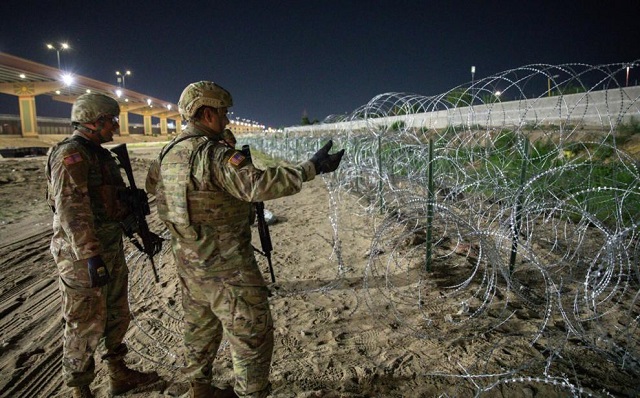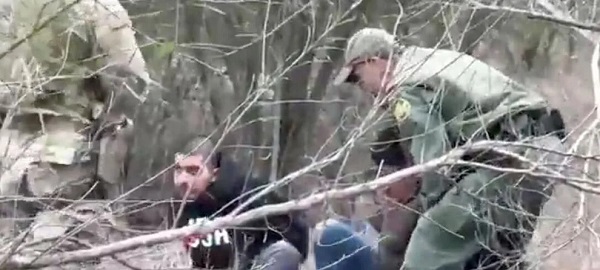Texas Department of Public Safety brush team apprehends gotaways and smuggler in Hidalgo County. Texas Department of Public Safety
By Bethany Blankley
Prior to President Donald Trump authorizing targeted strikes against Iranian nuclear sites on Saturday, federal agents and Texas Department of Public Safety troopers have been arresting Iranian nationals, nearly all men, in the U.S. illegally. In the last few months, federal prosecutors have also brought terrorism charges against Iranians, including those in the U.S. working for the Iranian government.
Iran is a designated state sponsor of terrorism. Iranian nationals illegally in the country are considered “special interest aliens” under federal law.
The U.S. Department of Homeland Security on Sunday issued a warning to all Americans to be on a heightened threat alert.
“The ongoing Iran conflict is causing a heightened threat environment in the United States,” DHS warned. “Low-level cyber attacks against US networks by pro-Iranian hacktivists are likely, and cyber actors affiliated with the Iranian government may conduct attacks against US networks.
“Iran also has a long-standing commitment to target US Government officials it views as responsible for the death of an Iranian military commander killed in January 2020.”
U.S. officials have no idea how many Iranians are in the U.S. illegally because at least two million “gotaways” were recorded entering the U.S. during the Biden administration. Gotaways are those who illegally entered the U.S. between ports of entry who were not apprehended.
Key arrests include an Iranian living in the sanctuary jurisdiction of Natick, Mass., who is charged “with conspiring to export sophisticated electronic components from the United States to Iran in violation of U.S. export control and sanctions laws,” The Center Square reported. Authorities accuse the Iranian of illegally exporting the technological equipment to a company in Iran that contracts with the Islamic Revolutionary Guard Corps (IRGC), a US-designated foreign terrorist organization (FTO). The company allegedly manufactured drones used by the IRGC that killed U.S. soldiers stationed in Jordan.
Texas DPS troopers have arrested dozens of Iranian special interest aliens. Last October, DPS troopers questioned Iranians who illegally entered the U.S. near Eagle Pass, Texas, who said they came through Mexico and were headed to Florida, Las Vegas and San Francisco, The Center Square reported.
Last November and December, DPS troopers arrested Iranians in Maverick County after sounding the alarm about an increase of SIAs they were apprehending, The Center Square reported.
U.S. Customs and Border Protection and Immigration and Customs Enforcement officers also apprehended an Iranian with terrorist ties who illegally entered the U.S. near Buffalo, New York, The Center Square reported.
More recently, in April, two Iranians were charged in New York with conspiring to procure U.S. parts for Iranian drones, conspiring to provide material support to the IRGC and conspiring to commit money laundering. They remain at large. The charges “lay bare how U.S.-made technology ended up in the hands of the Iranian military to build attack drones,” DOJ National Security Division chief Sue Bai said.
Also in April, two Iranians and one Pakistani, were indicted in Virginia “for conspiring to provide and providing material support to Iran’s weapons of mass destruction program resulting in death and conspiring to commit violence against maritime navigation and maritime transport involving weapons of mass destruction resulting in death.” The Pakistani is awaiting trial; the Iranians remain at large.
Their involvement in maritime smuggling off the coast of Somalia led to the death of two Navy SEALs, according to the charges.
Also in April, a naturalized citizen working for the Federal Aviation Administration as a contractor pleaded guilty to charges of “acting and conspiring to act as an illegal agent of the Iranian government in the United States” for a period of five years. He was indicted last December in the District of Columbia for “infiltrating a U.S. agency with the intent of providing Iran with sensitive information,” including exfiltrating sensitive FAA documents to Iranian intelligence.
“The brazen acts of this defendant – acting against the United States while on U.S. soil – is a clear example of how our enemies are willing to take risks in order to do us harm,” U.S. Attorney Edward Martin said. “We want to remind anyone with access to our critical infrastructure about the importance of keeping that information out of the hands of our adversaries. I want to commend our prosecutors and law enforcement partners who secured a guilty plea that will keep our country safer.”
Also in April, an Iranian national was indicted in Ohio for operating a dark web marketplace selling methamphetamine, cocaine, fentanyl, heroin and oxycodone and other drugs; and for stealing financial information, using fraudulent identification documents, counterfeit currencies, and computer malware. Working with German and Lithuanian partners, he was charged, servers and other infrastructure were seized, and drugs and other contraband were stopped from entering the U.S., DOJ Criminal Division head Matthew Galeotti said.
Also in April, ICE Homeland Security Investigations in New York announced a civil forfeiture action halting an Iranian oil sale scheme that went on for years under the Biden administration.
The scheme involved facilitating the shipment, storage and sale of Iranian petroleum product owned by the National Iranian Oil Company for the benefit of the IRGC and Islamic Revolutionary Guard Corps, designated FTOs. The facilitators allegedly claimed the Iranian oil was from Malaysia, manipulated tanker identification information, falsified documents, paid storage fees in U.S. dollars and conducted transactions with U.S. financial institutions. The federal government seized $47 million in proceeds from the sale.
The complaint alleges they provided material support to the IRGC and IRGC-QF because profits support “proliferation of weapons of mass destruction and their means of delivery, support for terrorism, and both domestic and international human rights abuses.”
Last December, a federal court in the District of Columbia ordered the forfeiture of nearly $12 million connected with Iran’s illicit petroleum industry, involving Triliance Petrochemical Company, the IRGC and Quds Forces. FBI Tampa and Minneapolis were involved in the investigation.
Examples also exist of Iranians making false statements when applying for naturalization, including an Iranian in Tampa indicted last year.
Related


















